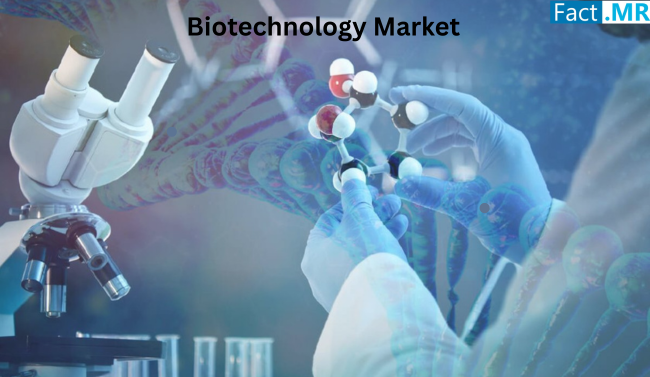Introduction: Why Biotechnology Matters
Biotechnology is needed for taking care of very serious issues. For example it helps by using drugs that can save people’s lives and it also helps food security issues. However it is not just scientists or laboratories that Biotechnology is limited to.
This is also creating energy solutions that are sustainable and also addressing critical issues like climate change.
Besides this, in the post-Covid era, Biotechnology has been prioritized by governments, researchers that have been working for years on innovative products to address various global needs.
If we talk about the forecasted growth here: The global Biotechnology market is expected to witness a double digit CAGR (around 13-15%) during the next 10 years. Well, this not only indicates exponential growth but also indicates a transformational phase where we approach industry, medicine, agriculture in the next decade.
Biotechnology Market Overview: Growth Drivers and Scope
The Biotechnology market is growing quickly because of various factors including a rise in innovation, global challenges, and current changes in societal expectations. When biology blended in with digital technologies, data science, and automation, many opportunities and possibilities arise.
Key Drivers:
- Rising occurrence of chronic diseases like neurodegenerative diseases, diabetes, pressing need for more targeted treatments are leading to various issues. Moreover, various innovations in the industry are offering opportunities where traditional medicine has fallen short.
- Moreover, global life expectancy has been rising and various chronic diseases such as diabetes, neurogenerative diseases are already on the rise. Overall, there is a huge demand for more effective treatments.
- In the last many years, the market has been witnessing been major breakthroughs such as gene editing, high adoption of AI in drug discovery, and next-gene sequencing. The developments have also reduced duration/time to market for new therapies and have also made precious interventions possible.
- Another driver is environmental initiatives, Biotechnology has been offering sustainable alternatives from carbon emissions to plastic waste. This has been driving future of bio-based materials and regenerative systems.
- Governments have been allocating public funds for venture capital, national biotech strategies is driving start-ups at higher levels. Moreover, M&A and IPOs are also soaring.
Biotechnology is making its way across sectors like pharmaceuticals, agriculture, food processing, industrial manufacturing, and environmental remediation. Since it contains many fields, it is one of the most flexible and promising markets in the world.
- Key Segments of the Biotechnology Market
- Healthcare & Pharmaceutical Biotechnology: One of the most prominent areas in the Biotechnology sector is healthcare along with pharmaceutical Biotechnology. No doubts, this plays very important role in many aspects such as development of new drugs, vaccines, diagnostic tools and others. If we talk about various applications, it might start from tracking chronic illnesses to treating genetic disorders. It has been contributing in many ways and reshaping the future of healthcare delivery.
- Biopharmaceuticals: Biopharmaceutical has the major share in the modern medicine that includes not just simplified products but also the advanced ones such as therapeutic proteins, monoclonal antibodies, and others. These are not like traditional drugs that could be chemically synthesized. Infect these are produced using living organisms. Ultimately, making it more targeted and effective. So what is unique about these? Well, their ability to work at a molecular level sets them apart and also, effectively interacting with specific cells in the body. This makes them effective and powerful and helps treat various complex chronic conditions.
- Genomics and Gene Therapy: Diseases that were incurable are now being treated using Gene therapy and this makes gene therapy very useful and crucial in today’s time. There are lot of tools responsible for the success of gene therapy like CRISPR, TALENs and viral vectors. Also, leading companies have been exploring various applications and cures. For example:
- Regenerative Medicine: Use of stem cells to regenerate organs and damaged tissues has been a reality for many patients and this has been applied in various sectors such as neurology, orthopedics, and cardiac care.
- Precision Medicine: Precision medicine as the name suggests is very effective. In this genes of the patients are examined to curate treatments that are very effective yet cause less side effects. It has been very effective for rare diseases and cancer.
- Agricultural Biotechnology
As the global population surges, ensuring food security has become one of the most biggest challenges. Agricultural Biotechnology offers a variety of innovative solutions to grow more food with less environmental harm.
- Genetically Modified (GM) Crops: Crops can be upgraded to protect against droughts through precious genetic engineering. For instance, pest-resistant cotton minimize the need for water and chemical pesticides. This also reduces crop failure and has an impact on agricultural productivity and food security.
- Biofertilizers and Biopesticides: Biofertilizers and biopesticides are not like conventional chemical inputs that can degrade soil quality and pollute waterways. Infect these nourish plants and ward off pests. Moreover, these eco-friendly alternatives restore biodiversity and enhance nutrient cycling. Moreover, these reduce the long term environmental footprint of farming. They are very crucial in promoting regenerative agriculture and reducing chemical dependency in intensive farming systems.
- Vertical and Smart Farming: Innovations such as vertical farming, AI-driving monitoring systems and IoT sensors have been building the way food is grown. Moreover, in smart indoor farms, biotech enabled seeds are cultivated under highly controlled situations. These are further maximizing yield, minimizing water and ensuring year-round production.
- Industrial & Environmental Biotechnology: The industrial biotech segment has been focusing on improving manufacturing processes and also reducing environmental footprints.
- Biofuels: Enzymes and engineered microbes have been offering alternatives to fossil fuels by converting biomass into ethanol and biodiesel.
- On the other hand, Bioplastics are the plant based polymers that are replacing petroleum derived plastics and Bioremediation (genetically modified bacteria and fungi can break down pollutants and detoxify industrial waste).
- Food Biotechnology: Because of biotech, what we eat and what we produce is changing quickly.
- Lab-grown Meat: Cultured meat gets rid of the need for animal slaughter and reduces emissions that come with livestock farming.
- Fermented Foods & Synthetic Proteins: Plant based or cell based proteins are trending fast and this is possible with precision fermentation that allows it to happen in the laboratory. These proteins mimic animal products are usually liked by the consumers.
- Functional Foods: These foods are known for their bioactive ingredients like omega-3s and plant sterols to promote well-being and health. These ones go beyond typical nutrition.
- Major Trends Shaping the Future
- CRISPR and Genetic Editing: The democratization of gene-editing tools is making procedures cheaper and easier to access. It also enables new therapies for rare and chronic diseases.
- Artificial Intelligence: AI is known not only in other industries but now it has carved a niche in Biotechnology and it has become a crucial part of everything from molecule screening to trial designs. This is making R&D faster, more accurate, and a lot more efficient.
- Synthetic Biology: Synthetic biology is known to redesign living systems effectively to solve problems in materials, health and energy.
- Biotech for Climate Resilience: From crops that can resist drought to carbon-sequestering microbes, biotech is helping humanity adjust to climate change as we speak.
- Challenges in the Biotech Market
Even with the potential it has, Biotechnology is running into big challenges:
- High R&D Costs: Just to bring a new biotech drug into the market, it can literally take around 10 years and also hundreds of millions of dollars.
- Regulatory Challenges: It is very difficult and complex to make way through global regulatory environments (FDA, EMA, CFDA, etc.) and usually it slows down innovation.
- Ethical and Social Concerns: From cloning to germline editing, there are a lot of questions because of biotech. These questions need to consider society and ethics.
- Intellectual Property Disputes: Because of ground-breaking advancements, legal battles over patents, licensing and trade secrets are happening.
- Market Access: Many developing economies are not able to access biotech solutions because of cost barriers and gaps in the infrastructure.
- Investment and Innovation Opportunities
The biotech sector has amazing and new opportunities for people who can spot the right trends:
- AI-integrated Biotech Startups: These companies are changing how drugs are developed. They use big data and predictive tools to speed up processes and make smarter decisions.
- Green Biotech Firms: Startups are getting a lot of traction by working on biodegradable materials sustainable packaging, and climate resilient crops.
- Healthcare Innovations: Various innovations are possible in areas that have been touched or addressed fully like mental health, pediatric rare diseases and neurodegenerative conditions and these can be easily impacted within next decade.
- Emerging Markets: India, China and Brazil are considered as the emerging markets that are building biotech ecosystems and also curating regulatory frameworks to be a large hub for innovation and R&D.
Conclusion: Biotech’s Transformative Potential
Biotechnology has the potential to improve health outcomes and feed the world sustainability. It coexists better with our environment. Biotechnology is at the cross roads of scalability, sustainability and science. Moreover, Biotechnology is not only meant for growth but it has become a strategic need for the future of humanity. In a world that is already dealing with food insecurity and various other issues like climate disasters, biotech is an important industry to look at. It’s the one that you engage with and invest in. Whether you are a policy maker or an investor looking to invest in a lucrative space or a researcher trying to address humanity’s toughest challenges, Biotechnology has allowed us all to watch new chapter of human progress unfold.



